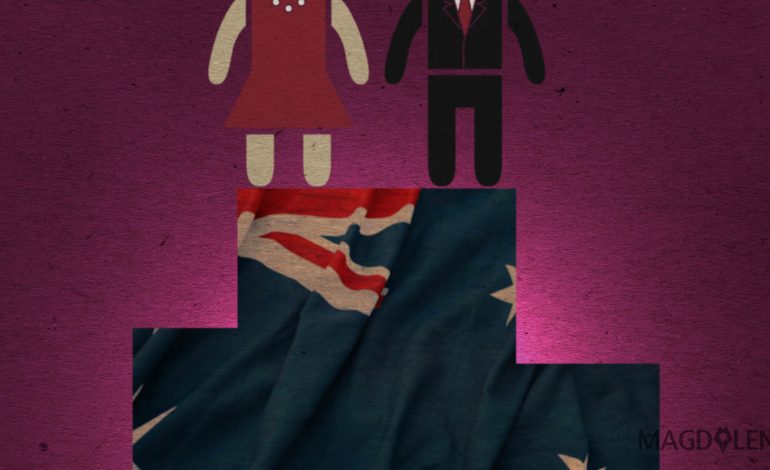“Leave No She Behind”: Involving Women in Policy-making and Peacemaking

Women have largely been left out of Indonesia’s rapid economic growth and it’s time to involve them in policy making to ensure no one is left behind. A regional dialogue held last week by MAMPU, Australia-Indonesia Partnership for Gender Equality and Women Empowerment, fleshed out the pervasive gender gap in Indonesia that has failed to uplift marginalized women from poverty and cycle of violence.
Themed “Leave No She Behind” the forum aimed at encouraging gender responsive and transformative sustainable development goals (SDGs), specifically targeting marginalized and vulnerable women who have been left out throughout the whole development process.
“This regional dialogue will be a space for women to share experiences and learn from initiatives that support women’s empowerment and gender equality, both in Indonesia as well as our neighboring countries,” said Woro Srihastuti Sulistyaningrum, Director of Family, Women, Children, Youth, and Sport at the National Development Planning Agency (Bappenas).
Said Fleur Davis, Minister-Counsellor, Australian Embassy at the event: “We need to ensure that women’s voices are heard in the policy-making, so that we all can improve women’s condition and develop concrete actions”.
MAMPU noted that gender gap in Indonesia manifests in a range of problems, from the high rates of child marriage (34 percent in South Kalimantan and West Sulawesi), maternal mortality at 305 deaths per 100,000 live births, stunting at 37 percent of Indonesian children, to domestic violence, interrupted schooling, and low participation of women in the workforce.
Sri Dianti Anwar, Expert Staff of the Ministry of Women’s Empowerment and Protection, said the government has been focusing on family resiliency, which includes economic, health, and psychological resilience.

“We can only tackle current problems by working on three main keys: resilience of the people (involving grassroot level community), alliance of civil society and organization, as well as human’s rights-based approach. Only by doing these, we can overcome issues regarding gender equality, violence, and gender discrimination,” she said.
Dr. Rashidah Shuib from Universiti Sains Malaysia, School of Health Sciences said that the government is usually very slow at recognizing and responding to issues regarding vulnerable women. This is why it is important to bring women’s voice in the political process, she said.
“I think, one way that we can achieve this is by directly speaking to the women in the margin, and not just people like me – people like us – we need to pay attention to their needs. We need to start bringing women in the margin to the center, giving them voice and home.”
Journalism Educator from the University of Phillipines-Diliman Yvonne Chua talks about the use of social media to encourage women’s engagement in monitoring policy-makers. Yvonne reacalled the #BabaeAko movement to counter President Rodrigo Duterte’s sexist and misogynist remarks.
When President Duterte was talking about the quality that the next Ombudsman should have, he said, “I want someone whose integrity people believe in. Of course, it could not be a politician, especially not a woman.” He instructed the Armed Forces of the Philippines to “shoot rebels in the vagina.” He also broke the law by whistling and catcalling a female reporter during a press conference.
This led to a network of women and activists to take a strong stance against the President. On May 20th officially launched a social media campaign #BabaeAko (I am a woman) to protest against the President’s sexist and misogynistic behaviour using the hashtag #BabaeAko. The movement led to street protests.
Yvonne Chua believes having an effective social media campaigns can help channel women’s demands and critics on issues regarding national policy.
“We need to increase the synergy while at the same time promote monitoring on policy implementation. It’s also very important to empower women at the grass-root and district levels,” she said.
She also points out the importance of mobile phones in advancing women’s progress as it is the main source of information and literacy as well as a communication and collaboration tool.
“In Indonesia, 184 million fewer women than men own a mobile phone. On top of that, 1.2 billion women still don’t use mobile internet. It is certainly a barrier when it comes to uniting the voice and clear call for action,” she added.
Also on the panel, Alissa Wahid of Gusdurian, a community network that focuses on religious and humanitarian issues adopting the thoughts and philosophy of former Indonesian president Abdurrahman Wahid (Gus Dur), highlighted the problem of women’s involvement in terrorism in the current climate of religious exclusivism.
“These days, we can no longer say that terrorism is a men’s act. The last bombing attack on the 13th of May proved that women have stepped up. They no longer work in the background, being recruiters or supporters, or taking care of logistics. Now, women contribute more in terrorism act. Their version of “gender equality’ translates to: not only men can do it (become suicide bombers), women can do it as well,” Alissa explained.
Alissa insisted that the goals should include turning women into active agents of peace: “We should ensure that women are playing their role to implement values of ‘peace’ during the wave of intolerance, and we can do this by implementing programs that challenge extremism and radicalism, which have been proliferating IN our society.”
Sri Dianti expressed her agreement on the importance of mainstreaming progressive thinking and a moderate way of practicing religion.
“We need more people and more religious clerics who are brave enough to tackle today’s problem of extremism. I believe that countering narratives that tend to be discriminative and conservative can only be done by mainstreaming progressive perspectives. This is where women can come forward,” she said.
Find out how this website helps internet users take control of their online data.






















